Affiche 12 Heures Circuit Sebring 23 Mars 1968 Ford Gt 40 Porsche 907 Automobile
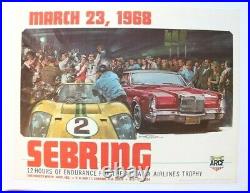
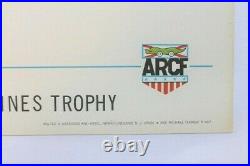
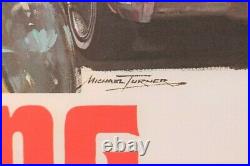
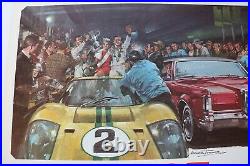
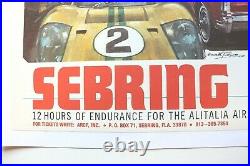
Pas de copie - pas de repro. MODELE D'AFFICHE TRES RARE. 62 CM X 48 CM. (+ 4 cm marge d'entoilage idéal pour encadrement). (4 cm linen backing margin for framing). Vous pouvez nous contacter pour la sauvegarde de vos affiches. Les 12 Heures de Sebring sont une course automobile.
D'une durée de douze heures qui se déroule chaque année au mois de mars sur le Sebring International Raceway. Elle a fait partie du championnat du monde des voitures de sport. Le championnat d'endurance de la FIA. Cette course est disputée dans le cadre du championnat American Le Mans Series.
(ALMS) dont elle est la manche d'ouverture ainsi que l'épreuve la plus prestigieuse. La course fait partie de l' United SportsCar Championship. Dans la mesure où l'ALMS se dispute selon une réglementation technique quasiment identique à celle de l' Automobile Club de l'Ouest.
Les 12 Heures de Sebring font souvent office de préparation pour les 24 Heures du Mans. De nombreuses équipes qui se sont imposées dans la Sarthe ont d'abord acquis une victoire à Sebring. Réputée difficile, la piste floridienne est en effet bosselée et composée en partie de plaques de ciment, non régulières, sur la portion empruntant les anciennes pistes de l'aéroport militaire (partie entourant le paddock et la ligne droite des stands).
La température au moment de la course est également proche des températures que l'on retrouve au Mans. La course a été remportée principalement par des écuries européennes. Détient le record de victoires dans cette course.
Compte douze victoires et Audi. Est devenu en 2010 la première marque française à s'imposer aux 12 Heures de Sebring, après trois participations consécutives. Les grandes séries de victoires de ces constructeurs ont globalement correspondu à celles des 24 Heures du Mans. En ce qui concerne les pilotes, Tom Kristensen est le pilote qui l'a remportée le plus de fois (6 victoires). Cinq champions du monde de Formule 1 Hawthorn, Fangio, P.
Hill, Surtees et Andretti et 12 pilotes français (Behra, Larrousse, Wollek, Dalmas, Aïello, Dumas, Collard, Lapierre, Duval, Panis Tréluyer et Bourdais) ont remporté cette épreuve. Les 12 Heures de Sebing sont la deuxième course d'endurance du monde quant à l'ancienneté, la notoriété et le prestige après les 24 Heures du Mans. En 2012, pour les soixante ans de la course, elle intègre le championnat du monde d'endurance FIA. The 12 Hours of Sebring is an annual motorsport. Held at Sebring International Raceway.
On the site of the former Hendricks Army Airfield. Air base in Sebring, Florida. The event is the second round of the WeatherTech SportsCar Championship.
And in the past has been a round of the now defunct World Sportscar Championship. And American Le Mans Series. In 2012, the race was the opening event of the FIA World Endurance Championship. 1949 Crosley Hot Shot that won the 1950 Sebring Race.On display at the Edge Motor Museum in Memphis, Tennessee. The track opened in 1950.
On an airfield and is a road racing. Course styled after those used in European.
The first race was a six-hour race on New Year's Eve 1950. The winning car is currently on display at the Edge Motor Museum in Memphis, Tennessee. The next race held 14 months later as the first 12 Hours of Sebring. The race is famous for its "once around the clock" action, starting during the day and finishing at night.
From 1953 to 1972 the 12 Hour was a round of the FIA's premier sports car series which was contested under various names including the World Sportscar Championship. And the International Championship for Makes. In its early years, the Sebring circuit combined former airport runways with narrow two-lane service roads. The 1966 event was a turning point in Sebring history, as the facilities and the safety of the circuit were heavily criticized. Five people were killed during the race, which was more people killed than in the race's prior 15-year history combined.
Crashed while approaching the hairpin. His car rolled several times, struck a utility pole and then exploded, landing in a ditch and killing McLean. In another incident Mario Andretti.In his Ferrari 365 P2. Tangled with Don Wester's Porsche 906. On the Warehouse Straight near the Webster Turns, killing four spectators and then crashing into a warehouse next to the track. Subsequent to these events, the facilities were upgraded and the circuit layout was changed, including eliminating the Webster Turns and creating the Green Park Chicane further down the track to move the straight further away from the airport warehouses. The circuit was made safer and there were no fatalities until 1980.
It is known as preparation for the 24 Hours of Le Mans. As the track's extremely bumpy surface, combined with south-central Florida's perennial hot weather, is a test of a car's reliability. In recent years, six overall victories have been achieved by the Audi R8. One fewer than the record seven wins of the Porsche 935. Has won the race more times than anyone else, with six victories-in 1999. 2020 will see the race be rescheduled to mid-November because of pandemic. And it will be raced under behind closed doors. Conditions for the first time. Races up until 1969 began with the traditional Le Mans start procedure, which was abolished at the end of the 1969 season following Jacky Ickx. Protesting; by 1970, drivers strapped into their cars waited until the starter waved the green flag, when they drove away.Since 1971, races begin with rolling starts. Which won the 1967 Sebring 12 Hour. Overall winner Porsche RS Spyder.
Leading at the last lap, when his engine of his Shelby American Ford GT40 Mk II. Gurney pushed his car over the finish line, beaten only by Ken Miles. However, his actions were ultimately determined to be against the rules and he did not receive credit for his finish. Made their race debut in the hotly contested GT1 class.
With Aston Martin winning its class for the first time in 49 years at Sebring ahead of the two Corvettes. Corvette had dominated the class the past three years with its previous generation C5R. Nissan Onroak DPi #22, 2018. The all-new Audi R10 TDI.
Won the 2006 edition of the race, the car's first ever run in competition. The much-hyped Porsche RS Spyder. Dropped to take 2nd place in its LMP2 class, behind the Intersport Lola car. The GT1 Corvette C6R team got their revenge against the Aston Martin, although the second Corvette came within 1/3 of a second of the podium in the closing laps of the race.
Again winning in the R10 TDI despite requiring more frequent refueling due to changes in American Le Mans series rules intended to even the field between gasoline and diesel-powered engines. 3.3 mile/5.31 km circuit. 613.84 km (381.42 mi) (Sam Collier Memorial Sebring Grand Prix of Endurance Six Hours). 5.382 mile/8.6 km circuit.1,213.445 km (754.000 mi). 1,447.766 km (899.600 mi).
1,405.923 km (873.600 mi). 1,523.083 km (946.400 mi). 1,623.506 km (1,008.800 mi). 1,648.612 km (1,024.400 mi). 1,673.718 km (1,040.000 mi).
1,573.295 km (977.600 mi). 1,640.243 km (1,019.200 mi). 1,740.666 km (1,081.600 mi). Scuderia SSS Republica di Venezia.
1,723.929 km (1,071.200 mi). International Championship for GT Manufacturers.1,749.035 km (1,086.800 mi). 1,790.878 km (1,112.800 mi). 1,908.038 km (1,185.600 mi). International Championship for Sports Cars.
5.4 mile/8.66 km circuit. 1,991.724 km (1,237.600 mi). 1,983.356 km (1,232.400 mi). 2,000.093 km (1,242.800 mi).
2,075.410 km (1,289.600 mi). 2,175.833 km (1,352.000 mi).2,167.465 km (1,346.800 mi). 1,891.301 km (1,175.200 mi).
No race due to energy crisis. 1,924.775 km (1,196.000 mi). 1,958.450 km (1,216.924 mi). 2,008.461 km (1,248.000 mi). 2,117.253 km (1,315.600 mi).
2,050.304 km (1,274.000 mi). 2,041.936 km (1,268.800 mi).4.7 mile/7.52 km circuit. 1,765.853 km (1,097.250 mi). 2,057.031 km (1,278.180 mi). 2,197.817 km (1,365.660 mi).
2,244.745 km (1,394.820 mi). 4.2 mile/6.85 km circuit. 1,971.092 km (1,224.780 mi).
2,103.380 km (1,306.980 mi). 2,182.753 km (1,356.300 mi). 1,990.936 km (1,237.110 mi). 3.72 mile/5.99 km circuit. 1,774.463 km (1,102.600 mi).
2,143.646 km (1,332.000 mi). 1,369.552 km (851.000 mi). 1,947.145 km (1,209.900 mi).
IMSA Exxon World Sportscar Championship. 1,548.189 km (962.000 mi). Riley & Scott Mk III.
1,935.075 km (1,202.400 mi). 1,628.012 km (1,011.600 mi).Professional Sports Car Exxon World Sportscar Championship. 1,925.178 km (1,196.250 mi).
Professional Sportscar Exxon World Sportscar Championship. 3.74 mile/6.02 km circuit. 1,863.781 km (1,158.100 mi). 2,203.192 km (1,369.000 mi).
2,060.282 km (1,280.200 mi). 2,185.328 km (1,357.900 mi).2,084.101 km (1,295.000 mi). 2,149.601 km (1,335.700 mi).
2,078.145 km (1,291.299 mi). 2,165.8 km (1,345.8 mi). 2,088.45 km (1,297.70 mi).
2,278.85 km (1,416.01 mi). 1,975.4 km (1,227.5 mi). 1,933.8 km (1,201.6 mi). 2,191.3 km (1,361.6 mi). 1,751.1 km (1,088.1 mi).2,046.4 km (1,271.6 mi). 1,432.51 km (890.12 mi).
2,094.59 km (1,301.52 mi). 2,070.88 km (1,286.79 mi). 2,094.96 km (1,301.75 mi). The car was in fact, a Porsche 935 K3 that has been modified with a single plug cylinder head and a front nose to resemble a Porsche 934 to comply to IMSA GTO. These races were stopped for a period of time due to heavy rain and/or accidents. The race clock was not stopped for these periods and counted towards the 12 Hours.Race record for most distance covered. Technically the race "winner" in 1950 was the Crosley Hot Shot of Fritz Koster / Ralph Deshon, entered by Victor Sharpe Jr. While the Wacker / Burrell Allard did cover more distance, the race was run under the "Index of Performance" handicapping rules and the Crosley, with a much smaller engine than the Cadillac-powered Allard, is listed in the Official Sebring Record Book as the winner. Cet item est dans la catégorie "Collections\Calendriers, tickets, affiches\Affiches pub: anciennes". Le vendeur est "posterstudio-france" et est localisé dans ce pays: FR.
Cet article peut être expédié au pays suivant: Monde entier.
- CIRCUIT AUTOMOBILE: SEBRING DAYTONA LE MANS MONZA GOODWOOD MONACO
- Dimensions: 48 x 62 cm
- Objet modifié: Non
- Impression: Couleur
- Epoque: Rétro (1900-1979)
- Pays de fabrication: États Unis
- Thème: AFFICHE COURSE AUTOMOBILE